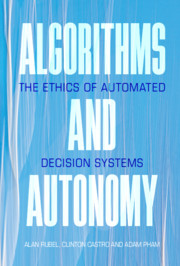Algorithms and Autonomy
Algorithms influence every facet of modern life: criminal justice, education, housing, entertainment, elections, social media, news feeds, work … the list goes on. Delegating important decisions to machines, however, gives rise to deep moral concerns about responsibility, transparency, freedom, fairness, and democracy. Algorithms and Autonomy connects these concerns to the core human value of autonomy in the contexts of algorithmic teacher evaluation, risk assessment in criminal sentencing, predictive policing, background checks, news feeds, ride-sharing platforms, social media, and election interference. Using these case studies, the authors provide a better understanding of machine fairness and algorithmic transparency. They explain why interventions in algorithmic systems are necessary to ensure that algorithms are not used to control citizens’ participation in politics and undercut democracy. This title is also available as Open Access on Cambridge Core.
Alan Rubel is an associate professor in the Information School and the Center for Law, Society & Justice at the University of Wisconsin-Madison. He has been a visiting scholar at the 4TU Centre for Ethics & Technology and Delft University of Technology, and a senior advisor to the Presidential Commission for the Study of Bioethical Issues.
Clinton Castro is an assistant professor in the Department of Philosophy at Florida International University.
Adam Pham is a postdoctoral instructor in the Division of the Humanities and Social Sciences at the California Institute of Technology.

